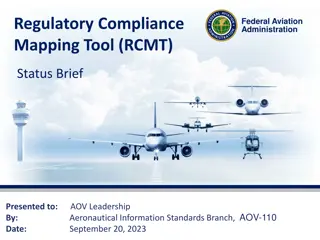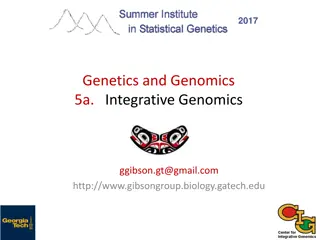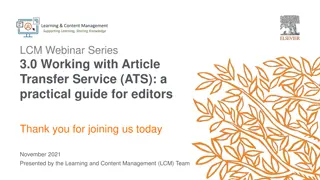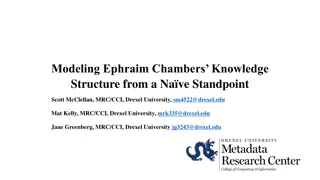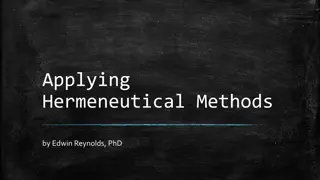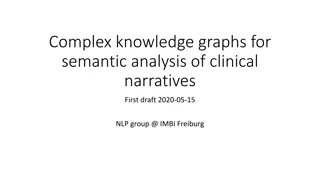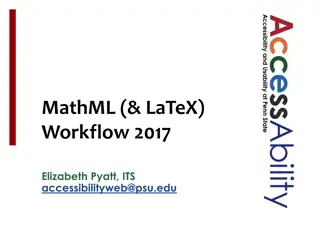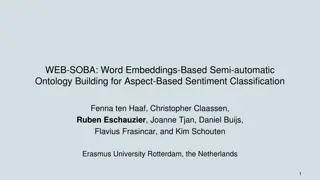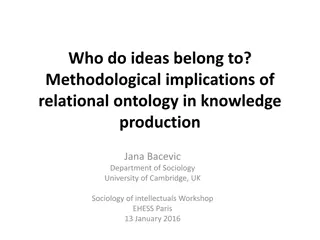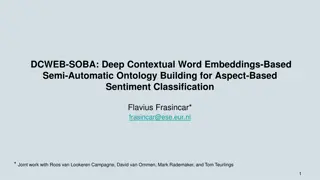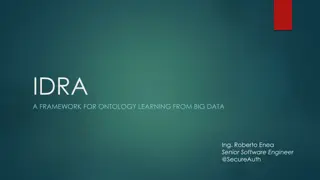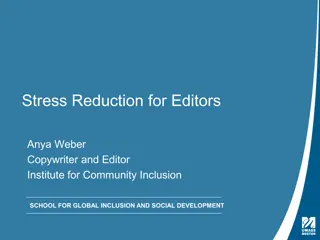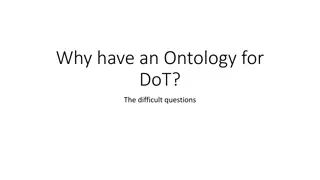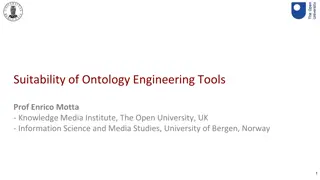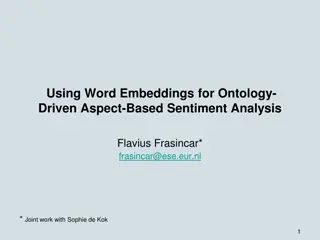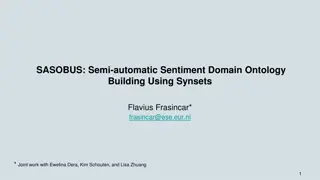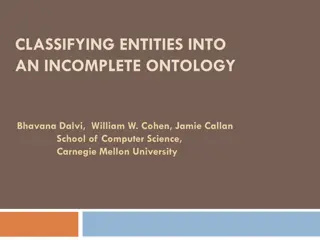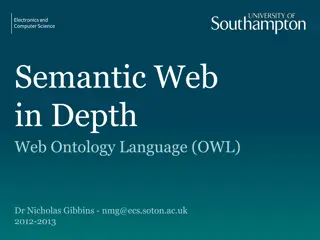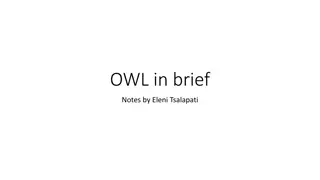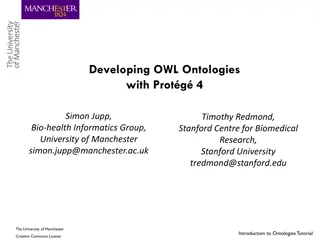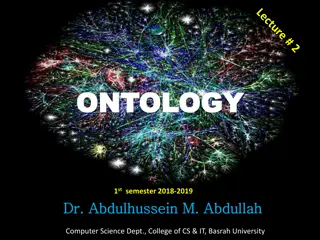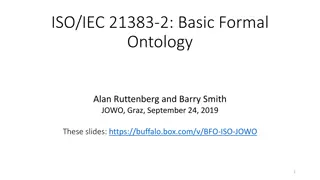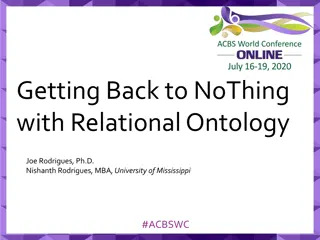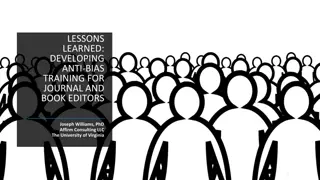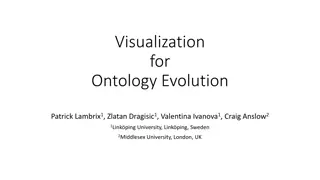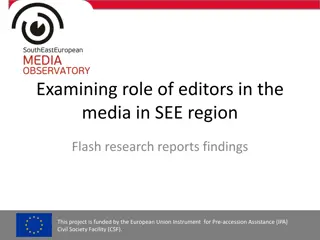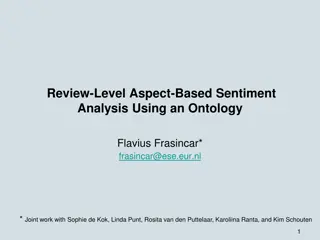Regulatory Compliance Mapping Tool (RCMT) Status Update - September 20, 2023
The Regulatory Compliance Mapping Tool (RCMT) Federal Aviation Administration status update for September 20, 2023, highlights significant achievements, including software development progress, document ingestion, ontology updates, user interface testing, and security framework enhancements. The RCM
0 views • 7 slides
Exploring Genetics and Genomics in Integrative Biology
Delve into the world of genetics and genomics through the lens of integrative biology, investigating the differences between cell types, the rationale for gene expression profiling, and the analysis of differential gene expression in various diseases. Uncover the significance of gene ontology, co-ex
0 views • 22 slides
Restructuring of USACE HEC-HMS Meteorologic Model
Significant modifications have been made to the HEC-HMS meteorologic model to enhance modeling tasks' ease and intuitiveness. The Met Model Restructure updates in versions 4.9 to 4.11 streamline meteorologic processes, introduce new features like automatic linkages and zonal editors for snowmelt, an
0 views • 19 slides
Practical Guide for Editors: Working with Article Transfer Service (ATS)
A comprehensive webinar series exploring the intricacies of Article Transfer Service (ATS) within Elsevier, highlighting its importance, benefits, workflows, and connections in Editorial Manager. Editors learn how ATS streamlines manuscript transfers between journals, benefiting both authors and edi
0 views • 14 slides
Understanding Knowledge Structure: Modeling Ephraim Chambers' Approach
Explore the significance of Chambers' Cyclopaedia published in 1728, focusing on its taxonomic tree structure and domain vocabulary. Learn about naive vs. informed modeling, the role of a Thesaurus/Ontology in expressing hierarchy, and the implications of talk exchanges in understanding knowledge st
1 views • 10 slides
Comparative Hermeneutics: Understanding Biblical Texts
Explore the application of hermeneutical methods on biblical texts such as Psalm 23 and 1 Tim. 2 through interpretation, translation, and contextual analysis. Delve into the meaning of texts, the role of signs and symbols, and the impact of varying presuppositions on interpretation. Reflect on the p
0 views • 46 slides
Semantic Analysis of Clinical Narratives Using Complex Knowledge Graphs
Need for improved semantic analysis of clinical narratives for information retrieval and decision support is addressed through the use of complex knowledge graphs. These graphs capture axiomatic descriptions of generalizable truths about entities in the medical domain, providing a language-independe
0 views • 8 slides
A Comprehensive Guide to MathML and LaTeX Workflow 2017
Delve into the intricacies of MathML and LaTeX workflow in 2017 with insights on equation editors, commonly used equations, comparison between Wiris and MathType, LaTeX usage in STEM research, and more. Uncover tips, workarounds, and new developments in MathJax setup since 2016, along with the impor
0 views • 40 slides
Advancements in Knowledge Graph Question Answering for Materials Science
Investigating natural language interfaces for querying structured MOF data stored in a knowledge graph, this project focuses on developing strategies using NLP to translate NL questions to KG queries. The MOF-KG integrates datasets, enabling query, computation, and reasoning for deriving new knowled
0 views • 13 slides
WEB-SOBA: Ontology Building for Aspect-Based Sentiment Classification
This study introduces WEB-SOBA, a method for semi-automatically building ontologies using word embeddings for aspect-based sentiment analysis. With the growing importance of online reviews, the focus is on sentiment mining to extract insights from consumer feedback. The motivation behind the researc
2 views • 35 slides
Understanding Relational Ontology and Knowledge Production in Sociology
This academic exploration delves into the concept of relational ontology and its methodological implications in knowledge production, focusing on the ownership of ideas and the role of intellectuals as knowledge producers. It discusses the foundational singularity, the generative significance of con
0 views • 12 slides
Semi-Automatic Ontology Building for Aspect-Based Sentiment Classification
Growing importance of online reviews highlights the need for automation in sentiment mining. Aspect-Based Sentiment Analysis (ABSA) focuses on detecting sentiments expressed in product reviews, with a specific emphasis on sentence-level analysis. The proposed approach, Deep Contextual Word Embedding
0 views • 34 slides
Insights into the Editorial Process of Applied Thermal Engineering Journal
Applied Thermal Engineering journal, under the leadership of Editor-in-Chief Prof. David Reay, has a rich history dating back to 1981. The journal's evolution, from its origins as Heat Recovery Systems to its current name and scope, reflects its commitment to advancing thermal engineering knowledge.
0 views • 29 slides
CCSDS System Architecture WG Restart Summary
System Architecture Working Group (SAWG) is restarting to refresh the CCSDS Reference Architecture for CMC. The motivation stems from the need to update the outdated RASDS and align it with evolving standards and projects. The plan includes incorporating operational, physical, and service viewpoints
0 views • 9 slides
Framework for Ontology Learning from Big Data with IDRA
IDRA (Inductive Deductive Reasoning Architecture) presents a comprehensive framework for ontology learning, focusing on data modeling and architecture components. ETL (Extract Transform Load) processes play a vital role in semantic enhancement of data, especially in identity and access governance co
0 views • 25 slides
Unleashing the Power of Web Components for Editors
Explore the world of web components and how they can enable editors to create reusable, customizable content easily. Learn about custom elements, Shadow DOM, and lifecycle functions that enhance the capabilities of web development without relying on frameworks.
0 views • 15 slides
Effective Stress Reduction Strategies for Editors
Discover practical tips and techniques for reducing stress in your editing work. From mindfulness practices to the benefits of meditation, this insightful content offers valuable insights to help editors stay calm and focused amidst demanding work environments. Embrace these stress-relief methods to
0 views • 39 slides
Importance of Ontology in System Development for DoT
Ontology plays a crucial role in the development of systems for DoT by facilitating the automation of tasks, improving consistency, and enhancing the efficiency of tool chains. It enables the transformation of semantic descriptions into algorithms, streamlining processes and reducing the need for ma
0 views • 7 slides
Challenges and Opportunities in Ontology Engineering Tools
Prof. Enrico Motta discusses the limitations of current ontology engineering tools, emphasizing the need for better support for creating ontological specifications. The lack of tools that offer a knowledge-level perspective and assist in sensemaking, navigation, and identifying relevant definitions
0 views • 5 slides
Using Word Embeddings for Ontology-Driven Aspect-Based Sentiment Analysis
Motivated by the increasing number of online product reviews, this research explores automation in sentiment mining through Aspect-Based Sentiment Analysis (ABSA). The focus is on sentiment detection for aspects at the review level, using a hybrid approach that combines ontology-based reasoning and
0 views • 26 slides
BabyDayOut Ontology: Describing Picture with Classes, Instances, and Relations
Ontology "BabyDayOut" is developed using RDF/RDFS to describe a picture. It includes classes such as Person, Animal, Baby, Picture, Man, and Gorilla with instances like John, KingKong, Jack, Peter, and Alex. Various relations like hasFriend, hasAnimalFriend, sonOf, depicts, hasEnemy, and hasTitle ar
0 views • 9 slides
SASOBUS: Semi-Automatic Sentiment Domain Ontology Building Using Synsets
Building on the need for automation due to the increasing volume and significance of online reviews, SASOBUS focuses on Aspect-Based Sentiment Analysis (ABSA). The motivation behind SASOBUS lies in the growth of sentiment mining for product reviews, particularly at the sentence level. Its approach i
0 views • 36 slides
Understanding Contexts: A Meta-Ontological Approach
Ontologies provide a general representation of reality, but knowledge is mostly context-dependent. Analyzing different types of contexts, from linguistic to manufacturing, remains a challenge. This study aims to deepen the understanding of the ontological nature of contexts by leveraging a meta-onto
0 views • 14 slides
Classifying Entities into an Incomplete Ontology: Exploratory EM Approach
The research discusses methods for hierarchical classification of entities into incomplete ontologies. It explores the challenges of evolving web-scale datasets and the need for classifying entities in an incomplete ontology structure. The Hierarchical Exploratory EM model is detailed, providing ins
0 views • 27 slides
Understanding OWL (Web Ontology Language) in Depth
Delve deep into the intricacies of OWL, a powerful ontology language designed for instance classification, consistency checking, and subsumption reasoning. Explore its features, versions, species, and trade-offs between expressiveness and reasoning complexity.
0 views • 76 slides
Understanding Web Ontology Language (OWL) in a Nutshell
Web Ontology Language (OWL) is a powerful tool for ontology modeling, allowing the creation of complex structures and relationships. OWL encompasses entities, expressions, and properties, enabling detailed descriptions of domains through axioms. The language supports both object and data properties,
0 views • 39 slides
Introduction to Developing OWL Ontologies with Protégé 4
Explore the world of developing OWL ontologies with Protégé 4 through a comprehensive tutorial by Simon Jupp and Timothy Redmond from Stanford Centre for Biomedical Research and the University of Manchester. Learn about OWL introduction, Protégé 4 interface, compositional approach, and the signi
0 views • 44 slides
Introduction to Ontology in Computer Science
Ontology is the study of existence, with applications in various fields like philosophy, linguistics, and computer science. In computer science, an ontology is an engineering artifact that defines a specific vocabulary to describe a domain, along with explicit assumptions about the vocabulary's inte
0 views • 33 slides
Understanding ISO/IEC Standards and Ontologies in Information Technology
Exploring the world of ISO/IEC standards and formal ontologies as presented by Alan Ruttenberg and Barry Smith at JOWO Graz in 2019. The slides cover topics such as basic formal ontology, connectors, domain ontologies, top-level ontologies, and the requirements for being a top-level ontology. ISO/IE
0 views • 97 slides
Ontology Quiz: Test Your Knowledge on Computational Logic and Philosophy
Delve into the world of ontology with this quiz featuring questions on computational complexity, mereology, standardization of OWL, and foundational ontologies. Test your understanding on topics such as first-order predicate logic, parthood in mereology, and more. Challenge yourself and expand your
0 views • 45 slides
Exploring Relational Ontology and Its Philosophical Implications
Delve into the fascinating realm of relational ontology, where concepts like the nature of existence, the essence of things, and the interconnectedness of all are dissected. From traditional Western perspectives to Eastern philosophies, this exploration challenges conventional views on reality, emph
0 views • 16 slides
Unlocking Writing Techniques: Tips for Crafting Persuasive Letters to Newspaper Editors
Explore valuable writing techniques to enhance letters addressed to newspaper editors. Learn how to structure ideas effectively, utilize impactful punctuation, develop persuasive arguments, and engage readers with compelling language. Enhance your writing skills to make a powerful impact.
0 views • 12 slides
Developing Anti-Bias Training Framework for Editors
Explore the framework for developing anti-bias training tailored for journal and book editors. Learn key steps such as problem description, intention setting, engaging allies, content commissioning process, reflection questions, and identifying who is involved. Dive into pre-work reflection exercise
0 views • 9 slides
Visualizing Ontology Evolution for Improved Knowledge Management
Ontologies are dynamic entities that evolve over time, impacting semantically-enabled applications and knowledge acquisition. This work focuses on identifying desired functionalities for ontology evolution systems, highlighting the steps involved in ontology evolution, and emphasizing the importance
0 views • 16 slides
Semantic Tool for Personal Information Protection
Semantic Tool for the Protection of Personal Information Act is a project led by Yahlieel Jafta, aiming to establish a knowledge base using ontology to assist individuals and organizations in interpreting the Act. The project focuses on the importance of ontologies in extending knowledge and enablin
0 views • 17 slides
Role of Editors in Media in South East Europe: Research Findings
Research funded by the European Union examines the role of editors in the media in six South East European countries. The study evaluates factors influencing editors' work, including regulation, education, hiring procedures, and economic/political situations. Findings reveal challenges in legislatio
0 views • 9 slides
Ontology-Driven Review-Level Aspect-Based Sentiment Analysis
This study presents an innovative approach to sentiment analysis at the review level, focusing on aspect-based sentiment analysis (ABSA) using ontologies. Motivated by the increasing volume of product reviews online, the research addresses the challenge of detecting sentiment associated with aspects
0 views • 30 slides
Insights into Editors' Objectives and Challenges in Academic Publishing
Understanding the objectives of editors in academic publishing is crucial for researchers. Their goals include attracting more readers, increasing citations, maintaining high quality, managing limited resources, and protecting referees. The toughest challenges involve convincing editors and referees
0 views • 9 slides
Comprehensive Guide to Ontology Editors and IDEs for Ontologies
Explore a wide range of Ontology Editors and Integrated Development Environments (IDEs) for managing ontologies efficiently. From simple text editors to advanced IDEs like Protégé and Web Protege, learn about various tools and syntax options available. Dive into Ontology Editors like Protégé 4.3
0 views • 16 slides
Advancing Digital Preservation Through Risk Assessment and Ontology
Explore the innovative approach of utilizing risk assessment methodologies and ontology to enhance digital preservation strategies. Learn how these tools help in identifying risks, mapping mitigation measures, and aligning real-world objectives with preservation goals for effective management of dig
0 views • 11 slides
